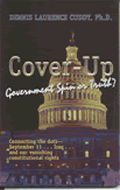Other
Cuddy
Articles:
Sept. 11:
Hold Government
Accountable
An
Economic Assault on
African-Americans and Others in The US
THE IRAQ WAR, OIL, AND WORLD GOVERNMENT
By
Dennis L. Cuddy, Ph.D.
March 26, 2007
NewsWithViews.com
When President Bush originally announced the U.S. invasion of Iraq, he called it Operation Iraqi Liberation----OIL. Think that was coincidental? One of the first messages he sent to the Iraqi people at the time was "Do not destroy oil wells."
The press and media have downplayed the role oil played regarding the American military engagement in Iraq, but in the expanded addendum to my COVER-UP book, written April 26 and May 1, 2003, I explained that in addition to the prominent role of the Project for the New American Century, there was another important group developing plans for Iraq.
About this lesser known, but extremely important, group I wrote that it was "an independent task force sponsored by the James A. Baker III Institute for Public Policy of Rice University and the Council on Foreign Relations (CFR). In addition to Enron chairman Kenneth Lay, the task force included many oil executives such as John Manzoni (British Petroleum), Steven Miller (Shell Oil), David O'Reilly (ChevronTexaco), and Jefferson Seabright (Texaco). Thomas McLarty of Kissinger McLarty Associates was also a member, and Stephen Oxman (Rhodes scholar, who was an Assistant Secretary of State in the Clinton Administration) was an observer. CFR president Leslie Gelb thanked the task force for 3 "complicated video conferences and teleconferences" (almost a year BEFORE the attacks of September 11, 2001), which resulted in the report, "Strategic Energy Policy Challenges for the 21st Century."
Relevant to the war against the Taliban in Afghanistan, the report indicated that "the exports from oil discoveries in the Caspian Basin could be hastened if a secure, economical export route could be identified swiftly....The option exists to downplay diplomatic activities that dictate certain geopolitical goals for specific transportation routes for Caspian oil in favor of immediate commercial solutions that may be sought by individual oil companies for short-term exports of 'early' oil, including exports through Iran." Note particularly the phrase "downplay diplomatic activities that dictate certain geopolitical goals." In other words, they do not want to call attention to "certain geopolitical goals" that may be driving their actions.
And relevant to the war with Iraq, the task force report stated: "Iraq remains a destabilizing influence to U.S. allies in the Middle East, as well as to regional and global order, and to the flow of oil to international markets from the Middle East. Saddam Hussein has also demonstrated a willingness to threaten to use the oil weapon and to use his own export program to manipulate oil markets. This would display his personal power, enhance his image as a 'Pan Arab' leader supporting the Palestinians against Israel, and pressure others for a lifting of economic sanctions against his regime. The United States should conduct an immediate policy review toward Iraq, including military, energy, economic, and political/diplomatic assessments. The United States should then develop an integrated strategy with key allies in Europe and Asia and with key countries in the Middle East to re-state the goals with respect to Iraqi policy and to restore a cohesive coalition of key allies. Like it or not, Iraqi reserves represent a major asset that can quickly add capacity to world oil markets and inject a more competitive tenor to oil trade...."
But what if you don't want to "add capacity" and have "a more competitive" market?
What if you want to limit the availability of oil in order to drive up prices? On March 18, Greg Palast published "It's Still the Oil: Secret Condi Meeting on Oil Before Invasion," in which he wrote that "in 2005, after a two-year battle with the State and Defense Departments, they released to my team at BBC Newsnight the 'Options for a Sustainable Iraqi Oil Industry.' Now, you might think our government shouldn't be writing a plan for another nation's oil. Well, our government didn't write it, despite the State Department seal on the cover. In fact, we discovered that the 323-page plan was drafted in Houston by oil industry executives and consultants. The suspicion is that Bush went to war to get Iraq's oil. That's not true. The document, and secret recordings of those in on the scheme, made it clear that the Administration wanted to make certain America did not get the oil. In other words, keep the lid on Iraq's oil production----and thereby keep the price of oil high."
Palast went on to explain that the report said Iraq should be required to remain an obedient member of the OPEC cartel and stick to the oil-production limits---"quotas"---which keep up oil prices. Palast continued: "And that's undoubtedly why Condoleezza Rice asked Fadhil Chalabi to take charge of Iraq's Oil Ministry. As former chief operating officer of OPEC, the oil cartel, Fadhil was a Big Oil favorite....Fadhil turned down Condi's offer....Ultimately, Iraq's Oil Ministry was given to Fadhil's tribesman, Ahmad Chalabi, a convicted bank swindler....But whichever Chalabi is nominal head of Iraq's oil industry in Baghdad, the orders come from Houston. Indeed, the oil law adopted by Iraq's shaky government this month is virtually a photocopy of the 'Options' plan first conceived in Texas long before Iraq was 'liberated.' In other words, the war has gone exactly to plan---the Houston plan."
The facts are that before the war, Iraq's oil production was 4 million barrels a day, and now it is down to 2.1 million barrels. Today oil is $57 a barrel compared to $18 a barrel before the Bush presidency.
Who specifically has benefited from the war? In my expanded addendum to my COVER-UP book, I wrote that "after the war with Iraq commenced, ABC News on March 22, 2003, related that 'weeks before the first bombs dropped in Iraq, the Bush administration began rebuilding plans.' Referring to 'Secret Bids,' ABC News indicated that it had 'obtained a copy of a 99-page contract worth $600 million....Among the companies believed to be bidding are Bechtel...and Halliburton, Vice-President Cheney's old firm'." Halliburton's primary business is "oil services," such as drilling and piping equipment. And since the war began, Halliburton's stock has tripled in value to $64 a share.
Also, do you remember President Bush's message to the Iraqis as the war began----"Do not destroy oil wells"? Well, guess who got the contract to extinguish oil well fires. It was U.S. contractor Kellogg Brown and Root, a subsidiary of Halliburton. And concerning the oil companies, the value of the 5 biggest companies' oil reserves has more than doubled during the war to $2.36 trillion. Specifically regarding Exxon-Mobil, its record profit of $10 billion last quarter is the largest of any corporation in history !
The power elite who are running the world know exactly what they are doing, and the war in Iraq is part of their long-range plan leading toward a World Socialist Government. One of their key agents is European Union High Representative Javier Solana, about whom I have written before. And on February 14 of this year in New York, he delivered a speech at the Arthur Burns Dinner, in which he stated that "it is true to say that the future global system will be a system of continents and continent-wide regimes, such as the European Union, African Union and ASEAN Plus." He also stressed "strengthening regional cooperation," and said that "in today's world, we must be ready to transcend the inter-state paradigm."
This basically is following Cecil Rhodes' plan "to take the government of the whole world" by linking regional associations, as explained by Rhodes' Association of Helpers member P.E. Corbett in POST-WAR WORLDS (1942). Perhaps the most recent example of the formation of a regional association (involving trade, security, etc.) is the Security and Prosperity Partnership of North America (SPP), which includes the U.S., Canada and Mexico. And in the SPP's "Report to Leaders, June 2005," one finds language such as "we need integrated, coordinated and seamless measures," and "increased economic integration," and "this Partnership is designed to be a dynamic, permanent process." Get the idea? This is to be "permanent," and "economic integration" means that if Mexico's economy goes in the tank, the U.S. and Canada will also be severely damaged ! Why would any American leader want this type of arrangement?
And perhaps the most recent example of the "linking" of regional arrangements can be found in the the first sentence of the March 20, 2007, FINANCIAL TIMES article, "EU and US to begin single market push," which states: "The European Union and the U.S. will next month start an ambitious initiative to harmonize regulations, norms and technical standards in up to 40 economic and industrial sectors, laying the cornerstone for a single market between the two regions." Note the article even used the word, "region," when referring to the U.S.
The power elite's technique of accomplishing their ultimate goal is to use the gradual approach, otherwise known as the "(Jean) Monnet" method, which was used to condition the people of Europe eventually to accept the European Union, after first having the European Economic Community. This approach began almost a hundred years ago, at about the time Sigmund Freud's nephew, Edward Bernays, authored PROPAGANDA (1928), in which he boasted that they could "manipulate the organized habits and opinions of the masses."
One of the most effective vehicles for manipulating or conditioning "the masses" is to use the public schools----a captive audience of young minds. In this regard, by the 1960s the "progressive education" followers of John Dewey had gained control of the schools down to the classroom level, and changed the emphasis from the cognitive domain (academic basics) to the affective domain (social relationships and feelings). This is because feelings are more manipulable and subject to conditioning. Have you noticed that for the last couple of decades people are more often asked how they "feel" about something rather than what they "think" about it?
To be sure, public schools have not been the only place in which the conditioning process was occurring. The Entertainment industry also has proved useful to the power elite in this regard. For example, rock music de-emphasizes lyrics about which one would "think," instead emphasizing the "beat" which gives one a hyper "feeling." According to Dr. Jack Wheaton, this "triggers major subconscious emotional responses in the body...that can easily overpower the higher reasoning portions of the brain and bring about uncontrollable physiological, psychological, and spiritual changes that are often in direct conflict with Biblical teachings."
|
Subscribe to the NewsWithViews Daily News Alerts! |
Also regarding entertainment, just witness the recent popularity of the movie (and book), "The DaVinci Code," in which Jesus is said to have had sex with Mary Magdalene. How is this an example of conditioning the masses. It brings Jesus down to the level of being just another human rather than God. That's the "feeling" engendered. But if you "think" about it, it makes no sense for Jesus to have sex with a woman. After all, Jesus is God and can do anything. Therefore, He is perfectly capable of instantly thinking Himself into a state of ecstasy far greater than any human sexual activity produces. "Think" about it, and resist the machinations of the power elite who seek to control us.
� 2007 Dennis Cuddy - All Rights Reserved
Order Dennis Cuddy's new book "Cover-Up: Government Spin or Truth?"
Sign Up For Free E-Mail Alerts
E-Mails are used strictly for NWVs alerts, not for sale
Dennis Laurence Cuddy, historian and political analyst, received a Ph.D. from the University of North Carolina at Chapel Hill (major in American History, minor in political science). Dr. Cuddy has taught at the university level, has been a political and economic risk analyst for an international consulting firm, and has been a Senior Associate with the U.S. Department of Education.
Cuddy has also testified before members of Congress on behalf of the U.S. Department of Justice. Dr. Cuddy has authored or edited twenty books and booklets, and has written hundreds of articles appearing in newspapers around the nation, including The Washington Post, Los Angeles Times and USA Today. He has been a guest on numerous radio talk shows in various parts of the country, such as ABC Radio in New York City, and he has also been a guest on the national television programs USA Today and CBS's Nightwatch.
E-Mail: Not Available
The facts are that before the war, Iraq's oil production was 4 million barrels a day, and now it is down to 2.1 million barrels. Today oil is $57 a barrel compared to $18 a barrel before the Bush presidency.












